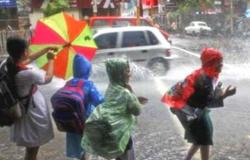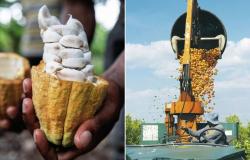
Guillaume and Anabel are not the most to be pitied: they live in a house perched on a hill, protected by a large gate. “There was damage, such as part of the roof flying off, 5 cm of water on the ground floor and trees falling all over the property. But this seems insignificant compared to the disasters suffered by more precarious populations”, adds Guillaume.
From their home, he observes a shantytown below: “Before, I saw relatively organized tin roofs. Now, it’s just a dump.”
For four days, the two friends have been working to repair the damaged gate, drain the water from the house, clean the mud, cut down and remove the fallen trees. “I finally found some nails!” rejoices Guillaume. “Tomorrow, I’m going to be a roofer to repair the blown-off part of the roof. It was impressive. The wind took it away as if nothing had happened, as easily as a piece of sticky paper to remove.”
Situation still very difficult in Mayotte where life is resuming: “I have never seen a disaster of this magnitude on national soil”
Anabel, the only veterinarian on Petit-Terre
For her part, Anabel made the decision to take care of the veterinary emergencies of Petit-Terre, one of the islands of Mayotte. A heavy responsibility that comes when she only has three months of experience in her center. “She is the only veterinarian available on our island,” explains Guillaume. “She has to be very careful: she goes there every day to protect the stock of drugs. These are valuable resources, and there is a risk that gang members will try to take them.”
Curfew and gangs
Three days after the storm, the authorities announced the establishment of a curfew from Tuesday evening, December 17, from 10 p.m. to 4 a.m. This system aims to prevent looting and ensure security in a battered archipelago, plagued by a health situation which is increasingly worrying residents. “The toll will be heavy, too heavy. The gangs should not add to this their rate of crime, of looting…”, predicts a local official, while research continues in the most devastated areas.
Blackout and rumors
Since the passage of Cyclone Chido, information has been difficult to circulate. According to Guillaume’s neighbors, there is only one Orange antenna left in working order. SMS and calls go through very poorly, except for Guillaume and Anabel who use their Belgian SIM cards, which are more stable on the network. “The lack of connection leaves room for rumors,” says Guillaume. “Yesterday, our neighbors warned us that there would be traffic in the street. In other words, there was a risk of looting by young gang members. In the end, nothing happened. But that’s also why The priority was to repair the gate.”
Guillaume also gets a lot of information from his neighbor, an employee at SMUR at Mamoudzou Hospital. According to him, the damage is immense: emergency rooms, operating theatre, intensive care unit and maternity ward have been flooded, complicating the care of the injured who are arriving by the dozens. “The neighbor explained to me that it is difficult to have a precise idea of the number of deaths. If the deaths occur in the hospital, they are counted, but often the families bury their dead directly and sometimes without reporting it” . The French authorities fear a heavy toll of several hundred deaths and thousands of injured.
Solidarity in chaos
Guillaume makes an alarming observation about his experience on the island. For him, many populations rely on fruit trees for food. These are abundant habit resources but which are beginning to be lacking. “From the house, before the storm, I could see a wide expanse of trees, a sort of savannah rich in fruit. Now I have a smooth, direct view of the coast. Everything has been washed away.” Guillaume’s neighbor shares this observation. In a show of solidarity, they organize common meals every evening. Barbecues where they grill the neighbor’s chickens. “He told me that if I saw a chicken wandering in the garden, I had to catch it at all costs. Yesterday we ate a hedgehog,” confides Guillaume between two little laughs.
Despite the difficulties, he maintains optimism and good humor: “I am one of the luckiest on this island. I won’t have too much trouble eating, and that motivates me to help the locals and Anabel.” Guillaume refuses to abandon his friend in this ordeal: “It’s her island that was destroyed. I want to stay to help her and share this mental load with her.”
However, he plans to return to Belgium once the crisis has stabilized, without hiding his emotion: “This will remain the most beautiful trip of my life. I have seen so much beauty, but also so much desolation. It makes me sad to see all these people in need and this destroyed nature… But I am happy to have done my years of scouting: my resourcefulness helps me a lot here.”





